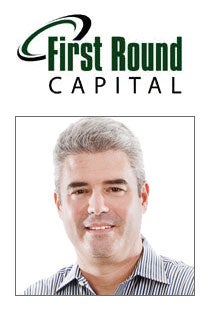 Chris Fralic is Managing Partner of First Round Capital, an early-stage investment company.
Chris Fralic is Managing Partner of First Round Capital, an early-stage investment company.
AdExchanger.com: It seems like First Round is everywhere – ok, maybe not everywhere, but you all are invested in quite a few companies at an early stage. What’s the method to the madness?
CF: Yes we are busy, and we do think we have a method to our model. We typically work with companies at the seed stage where it takes relatively small amounts of capital to get started, and we provide the bulk of our value and time in the first 18-25 months of a company’s formation. We were one of the most active investors in 2009 according to this Wall Street Journal article and now have 8 partners and investment professionals and we’re opening our NYC office in addition to our San Francisco and Philadelphia offices. We also focus on providing tools/platforms and “structural value” that go beyond just the capital we provide and the point person they have from First Round. But we do keep very busy and like to think we work as hard as our entrepreneurs.
What are a few key characteristics of a compelling product for an investment?
I’d say product is important but that the market size/opportunity and the entrepreneur/team are more important – we like to back great entrepreneurs going after big market opportunities. But on the product side, I’d say it’s really important to understand your customer and their problem and how your product solves it – too often that’s not understood or articulated clearly enough.
And how about entrepreneurs who are often the CEOs of the young startups – any key traits here? Or is it all about the product and its opportunity?
I’d say there are a number of key traits – we want people who are smart and passionate about their idea, and it goes without saying that we look for people with integrity and character who do what they say they’re going to do. We prefer entrepreneurs who have started a company before or worked in a startup environment so they’re not making first time mistakes, however we’ve made exceptions to that rule and have had a number of good outcomes with first-time CEO’s. Another key trait is also how quickly they can learn and adapt.
You’ve noted in the past about how companies “pivot” with their business models. Can you explain what you mean? Is this a good thing or a bad thing?
It’s a good thing – when we see a startup business plan we know one thing for sure about it – that it’s wrong – it’s just that no-one’s sure exactly how it’s wrong yet. We think the primary goal of seed stage investing is to help the entrepreneur validate or disprove their hypothesis, or to sufficiently “de-risk” it in order for them to attract additional external investment. So the key to a successful “pivot” is understanding how you might need to change your approach before you run out of money – or before you spend too much time or money.
Looking forward, what’s your view on M&A momentum in the digital media technology space? For example, is this the year? Or is it more of a 2011 or 2012 phenomenon?
It’s hard to look out too far, but things certainly seem to be lining up for a much better 2010 and hopefully beyond.
Do you think opportunities in the mobile advertising space are finally hitting their stride? What’s a key reason or three that mobile will continue to be hot?
The space has certainly heated up with the Admob/Google and Quattro/Apple acquisitions – but I still think it’s early and there’s room for more successful companies in the space. Smartphones and mobile devices are a huge part of the future if computing if not the computer of the future, and they know more about you than your laptop or desktop. Done right, mobile advertising can be huge, and it’s also pretty interesting to think about what Apple might do with advertising – they’ve never focused on it before.
If you’re an entrepreneur, what are your suggestions on the best way to pitch venture capital firm such as First Round Capital?
I put together a few thoughts on the subject a couple years ago and I think they’re mostly still true. At First Round we don’t provide direct email addresses on our site, but we do list our LinkedIn Profiles (http://firstround.com/contact.html) and we’re also actively blogging, tweeting, etc. so there are a number of ways to get connected. And we’ve also started something we call “Office Hours” which is a way that entrepreneurs can meet us and get to know us in an informal setting. We’ve already invested in a company we first met at one in NYC – so I’d recommend entrepreneurs keep an eye out at http://officehours.firstround.com/ for an upcoming Office Hours event.
Follow Chris Fralic (@ChrisFRC), First Round Capital (@firstround) and AdExchanger.com (@adexchanger) on Twitter.












